Asia’s largest night race – the OSIM Sundown Marathon – will be taking place on 4 July this year. The flag off times for this event range from 8pm for the brand new 5KM Fun Run, 10pm for the 10KM run and 12.30am for the 21.1KM Half Marathon. The event’s signature category, the Full Marathon (42.195KM) flags off at 11.30pm.
So with these starting times, many runners will be required to run – when their bodies would normally be resting on a normal night.
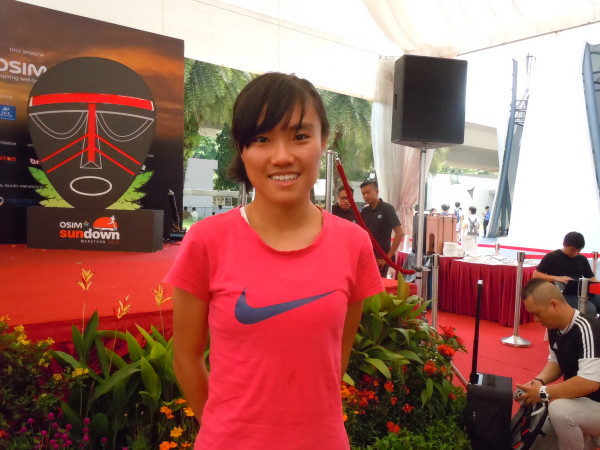
Miss Mok Ying Rong, one of Singapore’s elite female runners. She will be running 21.1KM at Sundown Marathon.
Here is what some of Singapore’s elite runners – the Mok Siblings, Dr Mok Ying Ren and his sister, Miss Mok Ying Rong, as well as Marcus Ong and Colin Tung – have to share about running a night race.
Do your training runs at a timing that mimics the race flag off time
One thing that most of the elite runners agree on, is that it is important to do training runs to get the body used to running at nights. Explained Dr Mok, 26, a medical doctor and a national marathon runner, “You’ll really have to get used to night running. If you want to perform well at a night race such as this one, you will have to shift your sleeping hours.”
Said Dr Mok, who was the 2013 SEA Games Marathon Gold Medallist, “So go to sleep really early and wake up in the wee hours to run. For high performance night running though, it may even require you to take pretty drastic measures and become a nocturnal night owl – where you will be sleeping the day away and functioning at your peak from 6pm onwards.”
Added Ong, 29, an IT executive and a national middle-distance runner, “I rarely run after 10PM at night as my normal bedtime is around 9pm. So to train for Sundown Marathon, I will be getting a few hours of sleep first – and then I will set my alarm to wake up sometime around 12 midnight to 1am to run. My training session will end at 3am. I’ll sleep again after that, and will be waking up at 6am again as my work begins at 7am.”
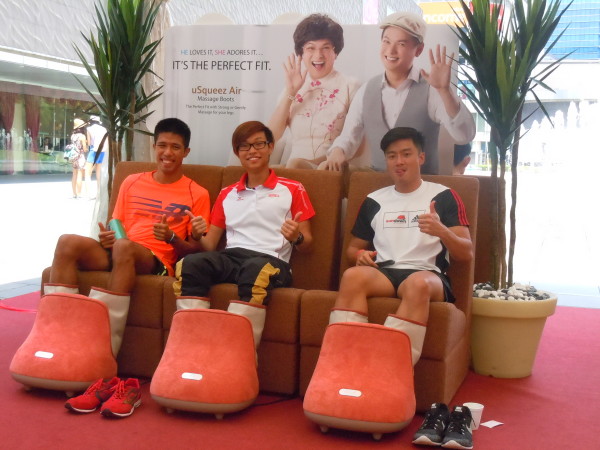
Elite runner Marcus Ong (extreme left) enjoys a leg massage – with two of the other Sundown Tribe ambassadors.
Said Ong, “When I first tried this type of night running for the first time I was really not used to it at all. My body was feeling very fatigued throughout the day – in fact, for the first three days after I had started my night training. I was talking nonsense to people and it was quite embarrassing. But by the fourth or fifth day, my body was getting used to the routine,”
Ong has won the Sundown Marathon’s 10KM team and individual events several times. For example, he emerged champion, at the 2013 edition of the Sundown Marathon’s 10KM event and was runner-up at the 2014 race, in the same category.
Tung, 26, a national steeplechase runner, also agreed about the levels of fatigue that the body would feel when running at night. Said Tung, who has previously won the Sundown Marathon 10KM team event as well as the Sundown Ultra Marathon 100KM Team of Four, “If you don’t do lead-up runs at a similar time to the flag-off timing of the run, the body may be used to sleeping at that hour – and so it is not primed for performance. It is primed for sleeping instead. So at the start line, you may be feeling sluggish or sleepy – and you do not want that to happen.”
To counteract the effects of fatigue, Ong recommends drinking lots of caffeine to keep the body awake and prevent it from falling asleep – although he realises that it’s not very healthy, though.
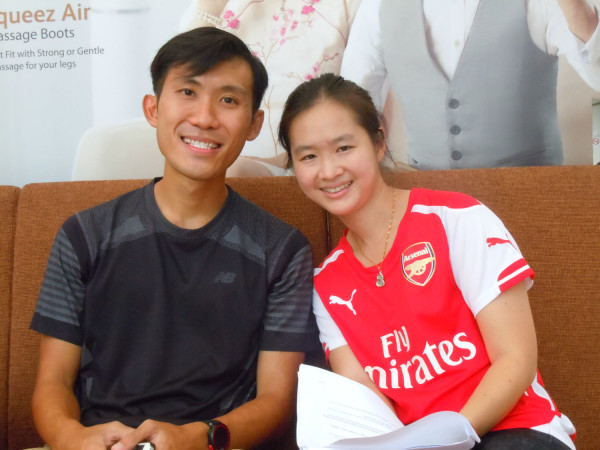
With national runner Colin Tung. He will be running the 21.1KM category at this year’s Sundown Marathon.
Body feels fatigued at a certain time because of its natural rhythm
Why does the body automatically feel so fatigued at this ungodly hour anyway? Explained Miss Mok, 21, a physiotherapist and a national runner, “Our body actually has a natural circadian flow and rhythm that it functions on. That’s how it automatically seems to know when to wake up and when to fall asleep.”
And while she does agree that running at night does help to improve one’s performance during a night race, Miss Mok – who won the 21.1KM category at Sundown Marathon last year – feels that doing so in the long term can actually be detrimental to the body’s natural rhythm, because it will completely screw up the body clock and may result in changes that are hard to reverse later on. She said, “For me, night running is a once in a blue moon thing, and I think the adrenaline from the race will prevent me from feeling sleepy. But I should be naturally pumped up for the race.”
Biggest difference between night and day running the diminished line of vision
However, Miss Mok admitted that one of the biggest differences of night running is the diminished line of vision that runners will have – compared to running in broad daylight.
She explained, “At night, our vision is diminished and because of that, there’ll be less distractions along the race route. This may make it harder for some people, but easier for others – it depends on what type of runner you are, and whether you are motivated by distractions.”
Fear of the unknown
“Also, for some runners there is that unnecessary fear of the unknown – that is, the unfamiliarity of running in the night time, because many people are too used to running in the daytime – so that is something that you must overcome, before Sundown Marathon. But as there is no sun, it is a lot cooler to run at nights – so I think that might make the run easier,” Miss Mok continued.
Tung agreed that running at nights is definitely cooler than running in the daytime. He explained, “Most definitely it will be cooler at night and not as hot. But I always see the humidity as being round the same regardless of whether it is day or night, so I don’t think there is a significant change.
Added Tung, “But you should definitely get used to the temperature and visibility at nights, as you will obviously not be able to see as well – and you may trip on something as a result. I have heard many stories of runners tripping during the night at Sundown Marathon due to poor vision. So you should also train yourself to get used to the lower visibility – in addition to clocking mileage.”
Humidity can be a challenge at night
Ong feels though, that sometimes, the humidity at night can work against runners.
He explained, “I feel that it depends on which month of the year it is. For example, the humidity in July may be very high and that will more than counter the fact that there is no sun.”
Get a good night’s rest and a dinner that’s high in carbohydrates prior to the race
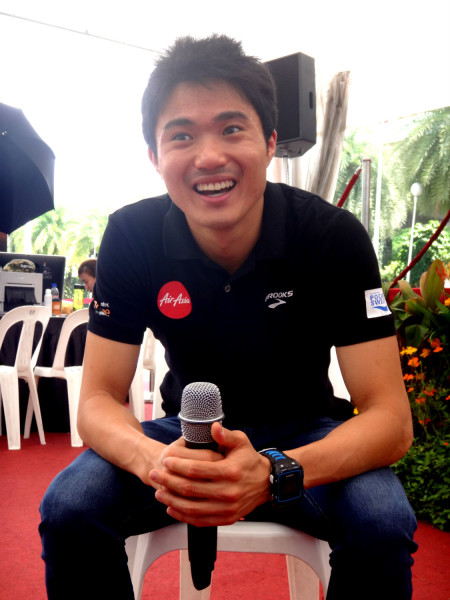
Dr Mok Ying Ren advises runners to eat a high-carb dinner before Sundown Marathon, but without gorging themselves.
In the 24 hours leading up to the Sundown Marathon, Miss Mok recommends runners to simply treat the day like a normal day. She said, “I believe that every one of us has work to do and things that we need to do throughout the day. You cannot just stop your whole day before of one race. But like for all races though, you should have a good night’s rest and eat a good meal with plenty of carbohydrates, such as pasta or rice, the night before.”
“Also, you should hydrate adequately throughout the day. Even though this is a night race, it doesn’t mean that you won’t sweat – so do not overlook the importance of hydration,” added Miss Mok.
Dr Mok also agreed. He said, “For Sundown Marathon, you should eat dinner at about 6pm to 7pm in the evening. That will give you more than four to five hours before the race for the food to digest. Choose a dinner that is high in carbohydrates – I recommend Pastamania. But of course, don’t go and upsize your portions though, and overeat, because your stomach will then give you problems during the race. Just eat your normal portions! Then about two hours before the run flags off, eat a power gel and maybe a snack bar to stop the hunger pangs. That should be enough to get you to the starting line.”
Go out there and just have fun
The elite runners advised that this year’s race participants should not worry too much about the effects of night running. Said Miss Mok, “For the Sundown Marathon, just go out there and have fun – regardless of whether you are gunning for a personal best or simply going there for the experience. Don’t worry too much about the fact that it is a night race. Just treat it like any other race and simply enjoy the whole experience.”

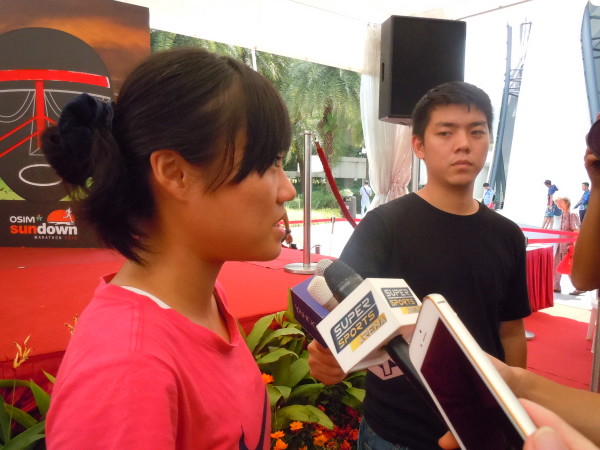
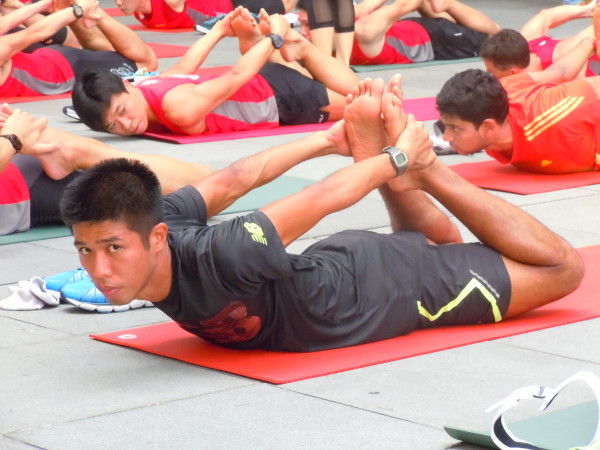
Leave a Comment